Laws to control stray dog and cattle menace do not have teeth
By S. Kenneth Shishir
[Pics. by M.N. Lakshminarayana Yadav]
Domesticated animals depend on humans for their everyday needs — food, water, shelter, veterinary care, love and more. Yet thousands of animals across city have no guardians to care for them, let alone a warm, comfortable place to curl up in at night.
Many suffer and die on the streets for lack of good homes. Animal homelessness is a complex crisis. Left to fend for themselves on the streets, animals often suffer and die after getting hit by vehicles, being attacked by other animals, succumbing to extreme temperatures, starving, contracting contagious diseases and facing other dangers. Many stray animals are poisoned, mutilated, tortured or killed in other cruel ways.
Animals are often abandoned by the people they depend on to care for them. Free-roaming animals (mammals) are a massive problem and the menace is completed by monkeys, especially the rhesus macaque, ubiquitous in India.
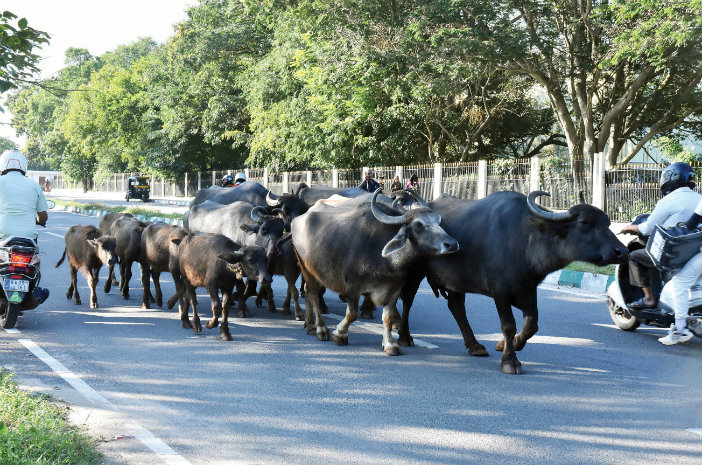
Living and being habitual with the problem
While city roads are already inadequate to cater to the needs of soaring human and vehicular population, the nuisance caused by strays is only adding to the woes of road users. Mysureans have lived with the problem of strays for years and there seems to be no relief at sight. They blame the Mysuru City Corporation’s (MCC) failure for the rise in number of strays.
Next to dogs, stray cattle, horses and pigs play a major role in causing traffic bottlenecks. Owners of livestock have been constantly letting them out on roads mostly during day time to save costs on cattle feed. Though laws clearly say that fines can be levied on cattle owners who let loose their livestock, penalisation of offenders has been rare.
Past incidents of a woman being killed by a stray horse at Gayathripuram and a girl being mauled by dogs at a residential layout are some of the examples of the problems these stray animals cause.
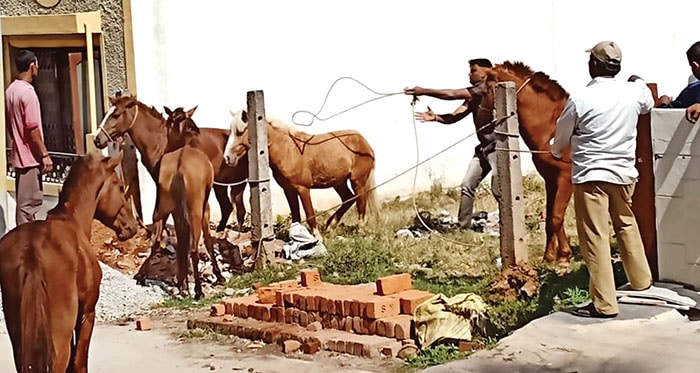
It may be recalled that 55-year-old Parvathamma was killed when stray horses attacked her at Gayathripuram 1st Stage in city in December last year. In another incident, a two-and-a-half-year-old girl was injured when a stray dog attacked her while she was playing in front of her house at Chamundi Vihar Layout.
Residents of many localities say that the menace of stray dogs has increased creating a sense of fear. They alleged that despite lodging several complaints with the MCC, no action has been taken. They say that there are many stray dogs in their locality that are sick and this can cause the spread of diseases.
The MCC acts only when reports of stray attacks are highlighted by the media. The dog menace is not sudden or recent. It has grown steadily over decades. Officials have been totally callous about tackling it. Had they been serious, the population of dogs and number of dog-bite cases would not have grown in startling numbers. How much hue and cry has been raised in the media over the years, but all schemes to curtail this menace have failed, say residents.
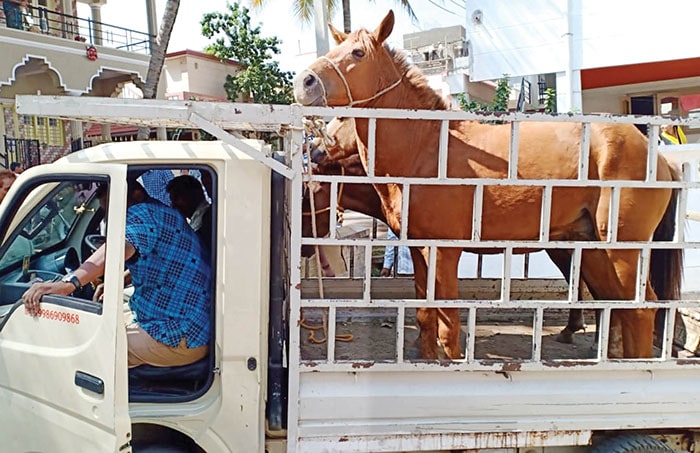
Dogs are sterilised regularly, defends MCC
As per Animal Birth Control programme for Dogs (ABCD) rules implemented by the Central Government in 2001, the Municipal Corporation or local authority has the power to sterilise and immunise street dogs to contain its population.
MCC Veterinarian Dr. S.C. Suresh says that the civic body launches drives to sterilise dogs. Stray dogs are picked up from extensions and residential areas and are incapacitated to reproduce by surgical removal (neutering) of uteruses and ovaries from bitches and testes from males. After post-operative care, the dogs are left at the respective places from where they were picked up.
Also, there is a lack of an efficient survey system. Therefore, one cannot accurately say if there is a decrease in population. However, as more dogs are being sterilised, their population will decrease at a slow pace in the coming years, officials say.
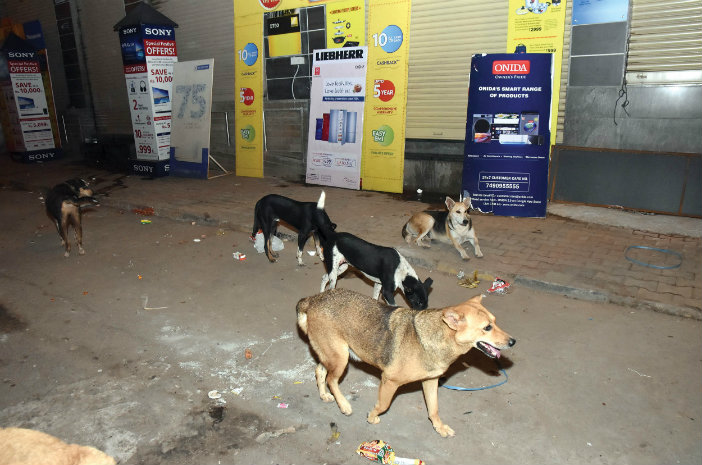
Dog Squad
Dr. Suresh said that teams of skilled dog-catchers, equipped with sufficient number of nets have been formed to catch strays which are then loaded into a lorry and transported to veterinary hospitals for sterilisation. The neutered stray dogs are also administered anti-rabies vaccine before leaving them back, he added.
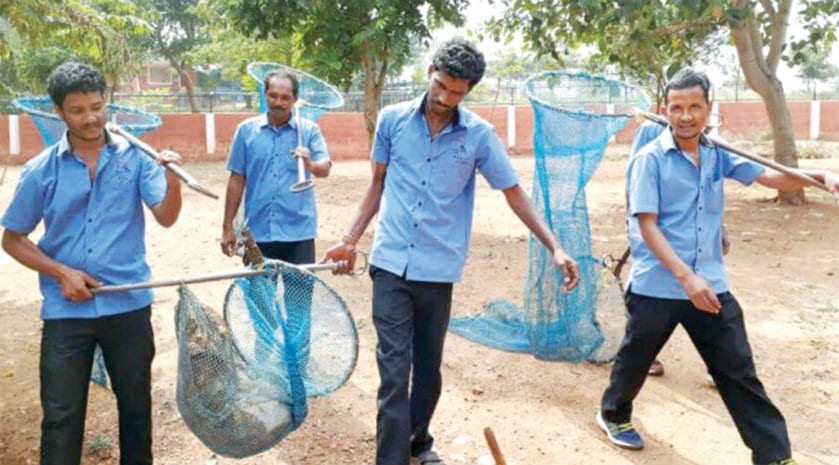
Culling stray dogs is banned
He said that capturing stray dogs and culling them is banned as the law does not permit it and hence the only solution left is to neuter the dogs so that the stray population comes down gradually. He further said that only those dogs that escape while being captured tend to reproduce again. But the puppies, after a certain age, are caught and neutered.
Dr. Suresh said that one can find pack of dogs near garbage heaps as meat and chicken waste is dumped by meat shops. As it is easy for the dogs to forage food there, they stay put at that place. He further said that if meat waste and leftover food are disposed of scientifically, the menace of dogs near garbage heaps could be avoided for which the residents and meat shop owners should co-operate.
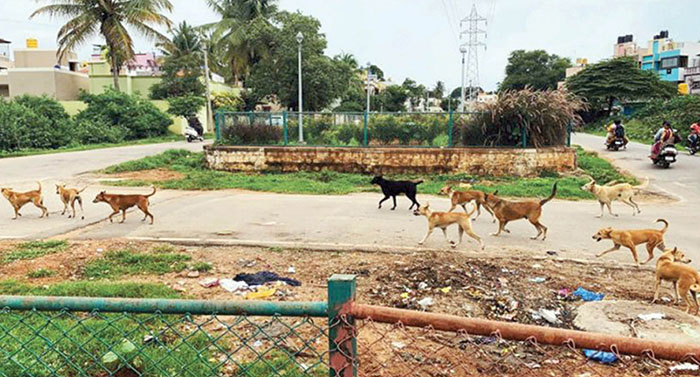
Bovine intervention: Over 8 to 10 cows captured daily
MCC Veterinarian Dr. Suresh said that the MCC conducts regular operation to capture stray cows from 9 am to 4 pm daily. On an average, 8 to 10 cows are captured daily and are shifted to the cattle shed at Sewage Farm.
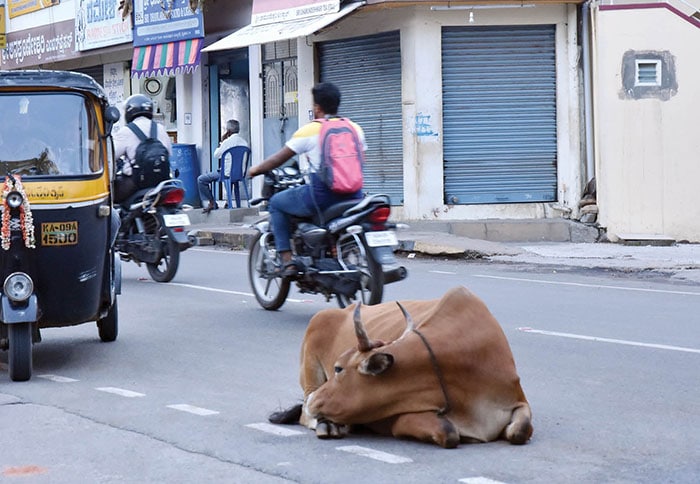
When the cattle owners come to the shed to take back their animals, a fine of Rs. 500 per cow is imposed on the owner and the cow is let off. But cattle owners again let their livestock on the road during night which is resulting in accidents. This is a never-ending cycle.
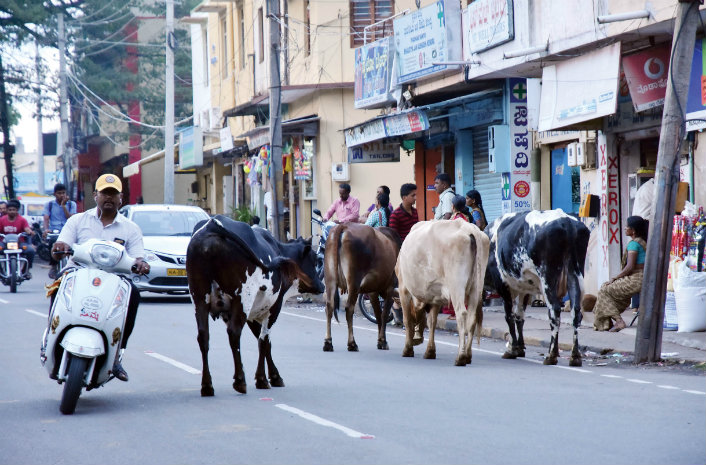
Rehab Centre for strays not to stray
Dog Cafe and Dog Park to be set up near Rayanakerehundi at an estimated cost of Rs.1.6 crore
In an effort to protect at-risk stray and free-roaming cattle, street dogs and horses, MCC has come up with a proposal to open a rehab centre in city. The Corporation has earmarked five-acre land to set up a rehab centre at its 40-acre property behind Mysore Public School near Rayanakerehundi on H.D. Kote Road, about 14 kms from city.
The issue was raised during the recently held Council Meeting. Members of the Council have agreed to the proposal put forward by Veterinary Department of MCC headed by veterinarian Dr. S.C. Suresh and team at an estimated cost of Rs.1.6 crore to open the rehab centre with a Sewage Treatment Plant Centre nearby.
MLA S.A. Ramdas has promised to assist in obtaining ready grants if a Detailed Project Report (DPR) is submitted to the Council.
In Mysuru city, around 20,000 stray cattle, 40,000 dogs and 1,000 horses (excluding MRC) including few groups of monkeys are said to be roaming free on the streets.
Dr. Suresh says: “Stray cattle, dogs and horses which are injured or sick will be treated at the proposed Rehab Centre where they will be provided all necessary facilities including food, water and shelter. There will also be a Dog Park along with walking path, swimming pool and playground with restaurant for visitors.”
According to reports, MCC Commissioner Gurudatta Hegde is also keen about launching Dog Cafe and Dog Park at the proposed site and is trying to obtain necessary funds allocated to companies under Corporate Social Responsibility from IT-BT companies.
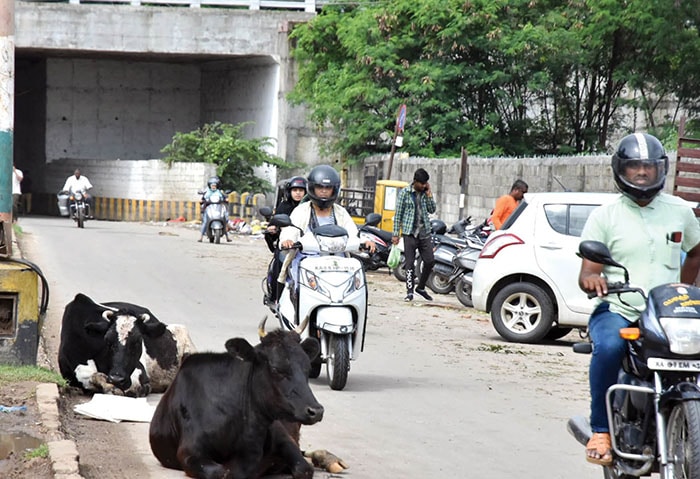
Sick stray horse rescued
An injured horse, which was lying on the road near DC’s Office recently, was rescued by People For Animals (PFA). On seeing the horse, which was injured with bleeding from the legs, some Good Samaritans had called the Police Control Room. Abhaya team came to the rescue and provided first-aid to the animal. Later, PFA shifted the horse to the rehab centre in Bogadi.

There is only one animal shelter in city
4,496 dogs sterilised in 2018 at PFA
In city, there is only one animal shelter (Danagala Doddi) of MCC located in Sewage Farm premises and the earlier one that was near Sahakara Bhavan is shut. Earlier, dead animals were buried at the landfill in Kesare and now they are buried at Vidyaranyapuram landfill.
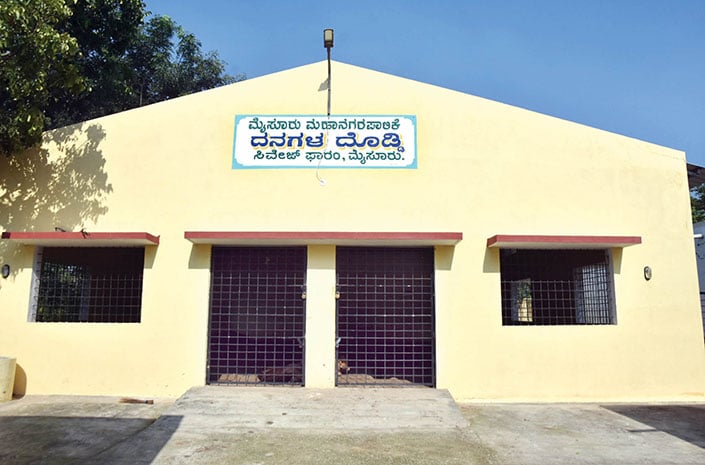
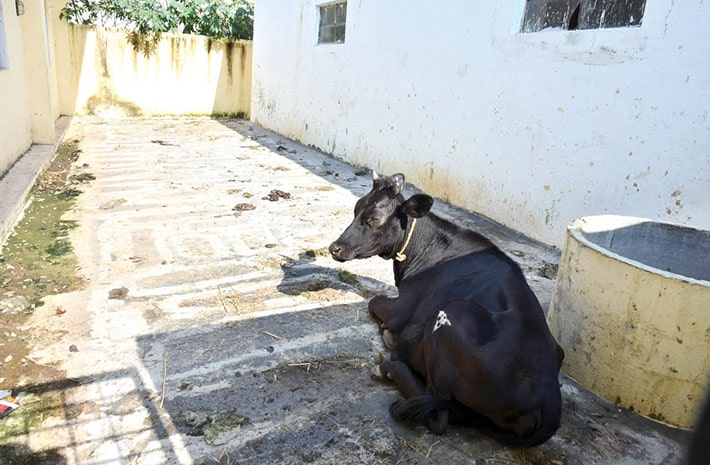
Sterilised dogs
People for Animals (PFA) has been involved in sterilisation of street dogs. According to its Managing Trustee Savitha Nagabhushan, over 10 to 15 stray dogs are sterilised at PFA daily for which Rs. 800 (per dog) is paid by the Mysuru City Corporation. In all, 4,496 dogs (both male and female) were sterilised in 2018.
After sterilisation, dogs are kept under post-operative care at PFA and only after they recover they are left in the place from where they were picked up. PFA has an adoption centre too where pets are de-wormed, vaccinated and tested before being put up for adoption.
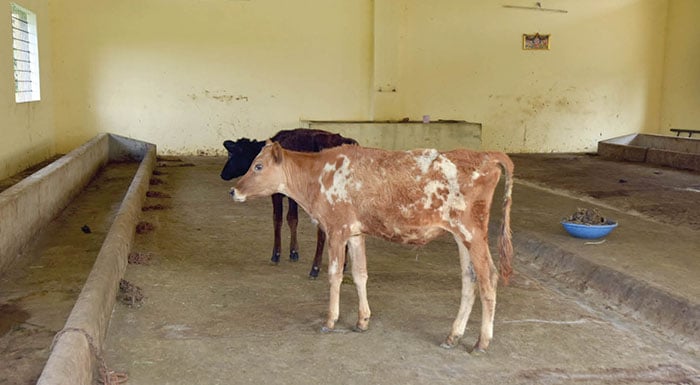
PFA has a shelter for sick and abandoned animals. It has a well-equipped clinic to take care of homeless animals. The clinic also serves pets, farm animals and wildlife and the doctors are on call. PFA provides outpatient treatment, complete health check up, animal birth control, x-ray facility, ultra sound facility, surgical care, gynaecological care, dermatology care, diagnostic laboratory testing, vaccination and ambulance service for animals.



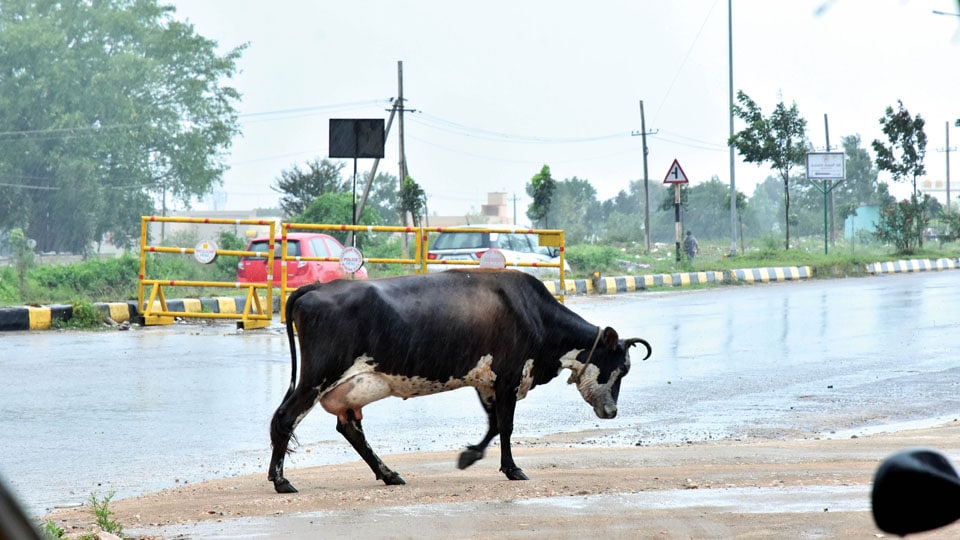




Recent Comments